夜莺颂 翻译
济慈名诗夜莺颂中英对照欣赏(2)

济慈名诗夜莺颂中英对照欣赏(2)济慈诗歌欣赏带翻译篇三TO AUTUMN 秋颂by John Keats(查良铮译)SEASON of mists and mellow fruitfulness,Close bosom-friend of the maturing sun;Conspiring with him how to load and blessWith fruit the vines that round the thatch-eves run;To bend with apples the moss’d cottage-trees,And fill all fruit with ripeness to the core;To swell the gourd, and plump the hazel shellsWith a sweet kernel; to set budding more,And still more, later flowers for the bees,Until they think warm days will never cease,For Summer has o’er-brimm’d their clammy cells.雾气洋溢、果实圆熟的秋,你和成熟的太阳成为友伴;你们密谋用累累的珠球,缀满茅屋檐下的葡萄藤蔓;使屋前的老树背负着苹果,让熟味透进果实的心中,使葫芦胀大,鼓起了榛子壳,好塞进甜核;又为了蜜蜂一次一次开放过迟的花朵,使它们以为日子将永远暖和,因为夏季早填满它们的粘巢。
Who hasth not seen thee oft amid thy store?Sometimes whoever seeks abroad may findThee sitting careless on a granary floor,Thy hair soft-lifted by the winnowing wind;Or on a half-reap’d furrow sound asleep. Drowsed with the fumes of poppies, while thy hook Spares the next swath and all its twined flowers: And sometimes like a gleaner thou dost keep Steady thy laden head across a brook;Or by a cyder-press, with patient look,Thou watchest the last oozings hours by hours.谁不经常看见你伴着谷仓?在田野里也可以把你找到,弥有时随意坐在打麦场上,让发丝随着簸谷的风轻飘;有时候,为罂粟花香所沉迷,你倒卧在收割一半的田垄,让镰刀歇在下一畦的花旁;或者.像拾穗人越过小溪,你昂首背着谷袋,投下倒影,或者就在榨果架下坐几点钟,你耐心地瞧着徐徐滴下的酒浆。
英国诗人济慈的经典诗歌《夜莺颂》原文及赏析

英国诗人济慈的经典诗歌《夜莺颂》原文及赏析夜莺颂第一节我的心疼痛,我感到昏昏欲睡,麻木不仁,好像是饮过毒鸩,又像是刚刚吞服过鸦片,开始沉向冥府的忘川。
这并非我对你的福气有所妒嫉,而是你的欢乐使我过度欣喜——你呀,羽翼翩翩的树精,在山毛榉的绿叶与荫影之中,在那歌声悠扬的地点,你舒展了喉咙,歌唱着夏天。
夜莺颂第二节啊,但愿有一口美酒,一口曾在地窖冷藏多年的美酒!人一尝就会想到花神,想到葱绿的酒乡,想起舞蹈、恋歌和丰收季节的欢狂。
啊,要是那杯酒带有南国的热气,红如人面,充满灵感之泉的真味,珍珠的泡沫在杯沿浮动,能把嘴唇染得绯红,我就会一饮而尽,悄然离开尘寰,随你隐没在幽暗的林间。
夜莺颂第三节远远地隐没,消失,并且忘记你在林间从不知晓的东西,忘记这里的厌倦、焦虑和烦躁不安。
这里,人们坐在一起长吁短叹;这里,老年瘫痪了,只剩得几根白发摇晃,青年也变得苍白,瘦削,以至死亡;这里,人们一思想就感到伤悲,就会绝望得两眼铅灰;这里,美人的双眸难以保持明丽,新生的爱情第二天就会凋敝。
夜莺颂第四节飞去,飞去,我要向你飞去,不是与酒神同驾豹车而去,而是乘坐诗神的无形的双翼,尽管这头脑恁地迟钝、团惑和呆滞。
啊,此刻我终于和你在一起了;夜,是这般地柔和,也许月后已经登上宝座,众星正在四周守望,但是,这里却没有光亮,除了几丝天光,随风穿过窗枝的隙缝,穿过绿叶的荫影和苔藓的曲径。
夜莺颂第五节我看不清什么花儿在我脚下,也望不见什么花儿在枝头挂,但是,在温馨的黑夜,我却能猜想这个季节的每一种芬芳,那就该有香草、灌木和野果树的花。
有山楂和野玫瑰的花,还有早谢的紫罗兰为绿叶遮盖,还有麝香蔷薇即将盛开——那种蔷薇是五月中旬的骄儿,流露着酒香,它是夏夜蚊蝇飞鸣的地方。
夜莺颂第六节我在黑暗中倾听你的歌声,我多次想到死亡,他可以给人安宁。
我在诗歌里亲昵地向他呼唤,求他把我的生命化为青烟。
现在我越发感到死亡的富丽,想在午夜安然地与世别离,但此刻你却以如此的狂喜倾吐着你的胸臆,你将永远歌唱不息,我死了就不会再听见你——你将唱给一堆草泥。
夜莺
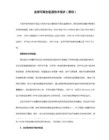
夜莺颂中英对照

My heart aches, and a drowsy numbness pains我的心在痛,困顿和麻木My sense, as though of hemlock I had drunk,刺进了感官有如饮过毒鸩Or emptied some dull opiate to the drains又像是刚把鸦片吞服One minute past, and Lethe-wards had sunk於是向列斯忘川下沉'Tis not through envy of thy happy lot,并不是我忌妒你的好运But being too happy in thine happiness,--而是你的快乐使我太欢欣That thou, light-winged Dryad of the trees因为在林间嘹亮的天地里In some melodious plot你呵,轻翅的仙灵Of beechen green, and shadows numberless,你躲进山毛榉的葱绿和荫影Singest of summer in full-throated ease.放开了歌喉,歌唱著夏季O, for a draught of vintage! that hath been 唉,要是有一口酒,那冷藏Cool'd a long age in the deep-delved earth,在地下多年的清醇饮料Tasting of Flora and the country green,一尝就令人想起绿色之邦Dance, and Provencal song, and sunburnt mirth! 想起花神,恋歌,阳光和舞蹈O for a beaker full of the warm South,要是有一杯南国的温暖Full of the true, the blushful Hippocrene,充满了鲜红的灵感之泉With beaded bubbles winking at the brim,杯缘明灭著珍珠的泡沫And purple-stained mouth给嘴唇染上紫斑That I might drink, and leave the world unseen,我要一饮而尽而悄然离开尘寰And with thee fade away into the forest dim和你同去幽暗的林中隐没Fade far away, dissolve, and quite forget远远地,远远隐没,让我忘掉What thou among the leaves hast never known,你在树叶间从不知道的一切The weariness, the fever, and the fret忘记这疲劳,热病,和焦躁Here, where men sit and hear each other groan;这使人对坐而悲叹的世界Where palsy shakes a few, sad, last gray hairs,在这里,青春,苍白,削瘦,死亡Where youth grows pale, and spectre-thin, and dies; 而瘫痪有几根白发在摇摆Where but to think is to be full of sorrow在这里,稍一思索就充满了And leaden-eyed despairs,忧伤和灰暗的绝望Where Beauty cannot keep her lustrous eyes,而美保持不住明眸的光彩Or new Love pine at them beyond to-morrow.新生的爱情活不到明天就枯凋Away! away! for I will fly to thee,去吧!去吧!我要朝你飞去Not charioted by Bacchus and his pards,不用和酒神坐文豹的车驾But on the viewless wings of Poesy,我要展开诗歌底无形的羽翼Though the dull brain perplexes and retards尽管这头脑已经困顿,疲乏Already with thee! tender is the night,去了,我已经和你同往And haply the Queen-Moon is on her throne,夜这般温柔,月后正登上宝座Cluster'd around by all her starry Fays;周围是侍卫她的一群星星But here there is no light,但这儿不甚明亮Save what from heaven is with the breezes blown 除了有一线天光,被微风带过Through verdurous glooms and winding mossy ways. 葱绿的幽暗和藓苔的曲径I cannot see what flowers are at my feet,我看不出是哪种花在脚旁Nor what soft incense hangs upon the boughs,什麼清香的花挂在树枝上But, in embalmed darkness, guess each sweet在温馨的幽暗理,我只能猜想Wherewith the seasonable month endows这时令该把哪种芬芳The grass, the thicket, and the fruit-tree wild; 赋予这果树,林莽和草丛White hawthorn, and the pastoral eglantine;这白枳花,和田野的玫瑰Fast fading violets cover'd up in leaves;这绿叶堆中易凋谢的紫罗兰And mid-May's eldest child,还有五月中旬的娇宠The coming musk-rose, full of dewy wine,这缀满了露酒的麝香蔷薇The murmurous haunt of flies on summer eves.它成了夏夜蚊蚋嗡营的港湾Darkling I listen; and, for many a time我在黑暗中里倾听,多少次I have been half in love with easeful Death,我几乎爱上了静谧的死亡Call'd him soft names in many a mused rhyme,我在诗思里用尽了我言辞To take into the air my quiet breath;求他把我的一息散入空茫Now more than ever seems it rich to die,而现在,死更是多麼的富丽To cease upon the midnight with no pain,在午夜里溘然魂离人间While thou art pouring forth thy soul abroad当你正倾泻你的心怀In such an ecstasy!发出这般的狂喜Still wouldst thou sing, and I have ears in vain-- 你仍将歌唱,但我却不再听To thy high requiem become a sod.你的莽歌只能唱给泥草一块Thou wast not born for death, immortal Bird!永生的鸟啊,你不会死去No hungry generations tread thee down;饿的世代无法将你蹂躏The voice I hear this passing night was heard今夜,我偶然听到的歌曲In ancient days by emperor and clown:当使古代的帝王和村夫喜悦Perha ps the self-same song that found a path或许这同样的歌也曾激荡Through the sad heart of Ruth, when, sick for home, 露丝忧郁的心,使她不禁落泪She stood in tears amid the alien corn;站在异邦的谷田里想著家The same that oft-times hath就是这声音常常Charm'd magic casements, opening on the foam在失掉了的仙域里引动窗扉Of perilous seas, in faery lands forlorn.一个美女望著大海险恶的浪花Forlorn! the very word is like a bell失掉了,这句话好比一声钟To toll me back from thee to my sole self!使我猛省到我站脚的地方Adieu! the fancy cannot cheat so well别了!幻想,这骗人的妖童As she is fam'd to do, deceiving elf.不能老耍弄它盛传的伎俩Adieu! adieu! thy plaintive anthem fades别了!别了!你怨诉的歌声Past the near meadows, over the still stream,流过草坪,越过幽静的溪水Up the hill-side; and now 'tis buried deep溜上山坡,而此时它正深深In the next valley-glades:埋在附近的溪谷中Was it a vision, or a waking dream?这是个幻觉,还是梦寐Fled is that music:--Do I wake or sleep? 那歌声去了——我是睡?是醒?。
最新整理济慈名诗夜莺颂中英对照欣赏

济慈名诗夜莺颂中英对照欣赏约翰济慈,他遗下的诗篇誉满人间,他的诗被认为完美体现了西方浪漫主义诗歌特色。
今天学习啦小编在这里为大家介绍济慈的名诗《夜莺颂》,欢迎大家阅读!济慈名诗夜莺颂中英对照O d e t o a N i g h t i n g a l e 《夜莺颂》M y h e a r t a c h e s,a n d a d r o w s y n u m b n e s s p a i n s 我的心在痛,困顿和麻木M y s e n s e,a s t h o u g h o f h e m l o c k I h a d d r u n k,刺进了感官有如饮过毒鸩O r e m p t i e d s o m e d u l l o p i a t e t o t h e d r a i n s 又像是刚把鸦片吞服O n e m i n u t e p a s t,a n d L e t h e-w a r d s h a d s u n k 於是向列斯忘川下沉T i s n o t t h r o u g h e n v y o f t h y h a p p y l o t,并不是我忌妒你的好运B u t b e i n g t o o h a p p y i n t h i n e h a p p i n e s s,--而是你的快乐使我太欢欣T h a t t h o u,l i g h t-w i n g e d D r y a d o f t h e t r e e s因为在林间嘹亮的天地里I n s o m e m e l o d i o u s p l o t你呵,轻翅的仙灵O f b e e c h e n g r e e n,a n d s h a d o w s n u m b e r l e s s,你躲进山毛榉的葱绿和荫影S i n g e s t o f s u m m e r i n f u l l-t h r o a t e d e a s e.放开了歌喉,歌唱著夏季O,f o r a d r a u g h t o f v i n t a g e!t h a t h a t h b e e n 唉,要是有一口酒,那冷藏C o o l d a l o n g a g e i n t h e d e e p-d e l v e d e a r t h,在地下多年的清醇饮料T a s t i n g o f F l o r a a n d t h e c o u n t r y g r e e n,一尝就令人想起绿色之邦D a n c e, a n d P r o v e n c a l s o n g, a n d s u n b u r n t m i r t h!想起花神,恋歌,阳光和舞蹈O f o r a b e a k e r f u l l o f t h e w a r m S o u t h,要是有一杯南国的温暖F u l l o f t h e t r u e,t h e b l u s h f u l H i p p o c r e n e,充满了鲜红的灵感之泉W i t h b e a d e d b u b b l e s w i n k i n g a t t h e b r i m,杯缘明灭著珍珠的泡沫A n d p u r p l e-s t a i n e d m o u t h给嘴唇染上紫斑T h a t I m i g h t d r i n k, a n d l e a v e t h e w o r l d u n s e e n,我要一饮而尽而悄然离开尘寰A n d w i t h t h e e f a d e a w a y i n t o t h e f o r e s t d i m和你同去幽暗的林中隐没F a d e f a r a w a y,d i s s o l v e,a n d q u i t e f o r g e t远远地,远远隐没,让我忘掉W h a t t h o u a m o n g t h e l e a v e s h a s t n e v e r k n o w n,你在树叶间从不知道的一切T h e w e a r i n e s s,t h e f e v e r,a n d t h e f r e t 忘记这疲劳,热病,和焦躁H e r e, w h e r e m e n s i t a n d h e a r e a c h o t h e r g r o a n;这使人对坐而悲叹的世界W h e r e p a l s y s h a k e s a f e w, s a d, l a s t g r a y h a i r s,在这里,青春,苍白,削瘦,死亡W h e r e y o u t h g r o w s p a l e,a n d s p e c t r e-t h i n,a n d d i e s;而瘫痪有几根白发在摇摆W h e r e b u t t o t h i n k i s t o b e f u l l o f s o r r o w 在这里,稍一思索就充满了A n d l e a d e n-e y e d d e s p a i r s,忧伤和灰暗的绝望W h e r e B e a u t y c a n n o t k e e p h e r l u s t r o u s e y e s,而美保持不住明眸的光彩O r n e w L o v e p i n e a t t h e m b e y o n d t o-m o r r o w.新生的爱情活不到明天就枯凋A w a y!a w a y!f o r I w i l l f l y t o t h e e,去吧!去吧!我要朝你飞去N o t c h a r i o t e d b y B a c c h u s a n d h i s p a r d s,不用和酒神坐文豹的车驾B u t o n t h e v i e w l e s s w i n g s o f P o e s y,我要展开诗歌底无形的羽翼T h o u g h t h e d u l l b r a i n p e r p l e x e s a n d r e t a r d s 尽管这头脑已经困顿,疲乏A l r e a d y w i t h t h e e!t e n d e r i s t h e n i g h t,去了,我已经和你同往A n d h a p l y t h e Q u e e n-M o o n i s o n h e r t h r o n e,夜这般温柔,月后正登上宝座C l u s t e r d a r o u n d b y a l l h e r s t a r r y F a y s;周围是侍卫她的一群星星B u t h e r e t h e r e i s n o l i g h t,但这儿不甚明亮S a v e w h a t f r o m h e a v e n i s w i t h t h e b r e e z e s b l o w n 除了有一线天光,被微风带过T h r o u g h v e r d u r o u s g l o o m s a n d w i n d i n g m o s s yw a y s.葱绿的幽暗和藓苔的曲径I c a n n o t s e e w h a t f l o w e r s a r e a t m y f e e t,我看不出是哪种花在脚旁N o r w h a t s o f t i n c e n s e h a n g s u p o n t h e b o u g h s,什麼清香的花挂在树枝上B u t,i n e m b a l m e d d a r k n e s s,g u e s s e a c h s w e e t在温馨的幽暗理,我只能猜想W h e r e w i t h t h e s e a s o n a b l e m o n t h e n d o w s 这时令该把哪种芬芳T h e g r a s s, t h e t h i c k e t, a n d t h e f r u i t-t r e e w i l d;赋予这果树,林莽和草丛W h i t e h a w t h o r n,a n d t h e p a s t o r a l e g l a n t i n e;这白枳花,和田野的玫瑰F a s t f a d i n g v i o l e t s c o v e r d u p i n l e a v e s;这绿叶堆中易凋谢的紫罗兰A n d m i d-M a y s e l d e s t c h i l d,还有五月中旬的娇宠T h e c o m i n g m u s k-r o s e,f u l l o f d e w y w i n e,这缀满了露酒的麝香蔷薇T h e m u r m u r o u s h a u n t o f f l i e s o n s u m m e r e v e s.它成了夏夜蚊蚋嗡营的港湾D a r k l i n g I l i s t e n;a n d,f o r m a n y a t i m e我在黑暗中里倾听,多少次I h a v e b e e n h a l f i n l o v e w i t h e a s e f u l D e a t h,我几乎爱上了静谧的死亡C a l l d h i m s o f t n a m e s i n m a n y a m u s e d r h y m e,我在诗思里用尽了我言辞T o t a k e i n t o t h e a i r m y q u i e t b r e a t h;求他把我的一息散入空茫N o w m o r e t h a n e v e r s e e m s i t r i c h t o d i e,而现在,死更是多麼的富丽T o c e a s e u p o n t h e m i d n i g h t w i t h n o p a i n,在午夜里溘然魂离人间W h i l e t h o u a r t p o u r i n g f o r t h t h y s o u l a b r o a d 当你正倾泻你的心怀I n s u c h a n e c s t a s y!发出这般的狂喜S t i l l w o u l d s t t h o u s i n g,a n d I h a v e e a r s i n v a i n--你仍将歌唱,但我却不再听T o t h y h i g h r e q u i e m b e c o m e a s o d.你的莽歌只能唱给泥草一块T h o u w a s t n o t b o r n f o r d e a t h,i m m o r t a l B i r d!永生的鸟啊,你不会死去N o h u n g r y g e n e r a t i o n s t r e a d t h e e d o w n;饿的世代无法将你蹂躏T h e v o i c e I h e a r t h i s p a s s i n g n i g h t w a s h e a r d 今夜,我偶然听到的歌曲I n a n c i e n t d a y s b y e m p e r o r a n d c l o w n:当使古代的帝王和村夫喜悦P e r h a p s t h e s e l f-s a m e s o n g t h a t f o u n d a p a t h 或许这同样的歌也曾激荡T h r o u g h t h e s a d h e a r t o f R u t h,w h e n,s i c k f o r h o m e,露丝忧郁的心,使她不禁落泪S h e s t o o d i n t e a r s a m i d t h e a l i e n c o r n;站在异邦的谷田里想著家T h e s a m e t h a t o f t-t i m e s h a t h就是这声音常常C h a r m d m a g i c c a s e m e n t s,o p e n i n g o n t h e f o a m在失掉了的仙域里引动窗扉O f p e r i l o u s s e a s,i n f a e r y l a n d s f o r l o r n.一个美女望著大海险恶的浪花F o r l o r n!t h e v e r y w o r d i s l i k e a b e l l失掉了,这句话好比一声钟T o t o l l m e b a c k f r o m t h e e t o m y s o l e s e l f!使我猛省到我站脚的地方A d i e u!t h e f a n c y c a n n o t c h e a t s o w e l l别了!幻想,这骗人的妖童A s s h e i s f a m d t o d o,d e c e i v i n g e l f.不能老耍弄它盛传的伎俩A d i e u!a d i e u!t h y p l a i n t i v e a n t h e m f a d e s别了!别了!你怨诉的歌声P a s t t h e n e a r m e a d o w s,o v e r t h e s t i l l s t r e a m,流过草坪,越过幽静的溪水U p t h e h i l l-s i d e;a n d n o w t i s b u r i e d d e e p 溜上山坡,而此时它正深深I n t h e n e x t v a l l e y-g l a d e s:埋在附近的溪谷中W a s i t a v i s i o n,o r a w a k i n g d r e a m?这是个幻觉,还是梦寐F l e d i s t h a t m u s i c:--D o I w a k e o r s l e e p?那歌声去了我是睡?是醒?济慈诗歌欣赏带翻译篇一B r i g h t S t a r灿烂星辰J o h n K e a t s约翰济慈B r i g h t s t a r, w o u l d I w e r e s t e d f a s t a s t h o u a r t愿我如你坚定璀璨明星!N o t i n l o n e s p l e n d o u r h u n g a l o f t t h e n i g h t 但不要高悬夜空显赫孤零。
夜莺颂-济慈(英文)

John Keats - Ode to a NightingaleMy heart aches, and a drowsy numbness painsMy sense, as though of hemlock I had drunk,Or emptied some dull opiate to the drainsOne minute past, and Lethe-wards had sunk:'Tis not through envy of thy happy lot,But being too happy in thine happiness, --That thou, light-winged Dryad of the treesIn some melodious plotOf beechen green, and shadows numberless, Singest of summer in full-throated ease.O, for a draught of vintage! that hath beenCool'd a long age in the deep-delved earth, Tasting of Flora and the country green,Dance, and Proven?al song, and sunburnt mirth!O for a beaker full of the warm South,Full of the true, the blushful Hippocrene,With beaded bubbles winking at the brim,And purple-stained mouth;That I might drink, and leave the world unseen, And with thee fade away into the forest dim:Fade far away, dissolve, and quite forgetWhat thou among the leaves hast never known, The weariness, the fever, and the fretHere, where men sit and hear each other groan; Where palsy shakes a few, sad, last gray hairs, Where youth grows pale, and spectre-thin, and dies;Where but to think is to be full of sorrowAnd leaden-eyed despairs,Where Beauty cannot keep her lustrous eyes,Or new Love pine at them beyond to-morrow.Away! away! for I will fly to thee,Not charioted by Bacchus and his pards,But on the viewless wings of Poesy,Though the dull brain perplexes and retards: Already with thee! tender is the night,And haply the Queen-Moon is on her throne, Cluster'd around by all her starry Fays;But here there is no light,Save what from heaven is with the breezes blown Through verdurous glooms and winding mossy ways.I cannot see what flowers are at my feet,Nor what soft incense hangs upon the boughs,But, in embalmed darkness, guess each sweet Wherewith the seasonable month endowsThe grass, the thicket, and the fruit-tree wild;White hawthorn, and the pastoral eglantine;Fast fading violets cover'd up in leaves;And mid-May's eldest child,The coming musk-rose, full of dewy wine,The murmurous haunt of flies on summer eves.Darkling I listen; and, for many a timeI have been half in love with easeful Death,Call'd him soft names in many a mused rhyme,To take into the air my quiet breath;Now more than ever seems it rich to die,To cease upon the midnight with no pain,While thou art pouring forth thy soul abroadIn such an ecstasy!Still wouldst thou sing, and I have ears in vain -- To thy high requiem become a sod.Thou wast not born for death, immortal Bird!No hungry generations tread thee down;The voice I hear this passing night was heardIn ancient days by emperor and clown:Perhaps the self-same song that found a path Through the sad heart of Ruth, when, sick for home, She stood in tears amid the alien corn;The same that oft-times hathCharm'd magic casements, opening on the foamOf perilous seas, in faery lands forlorn.Forlorn! the very word is like a bellTo toll me back from thee to my sole self!Adieu! the fancy cannot cheat so wellAs she is fam'd to do, deceiving elf.Adieu! adieu! thy plaintive anthem fadesPast the near meadows, over the still stream,Up the hill-side; and now 'tis buried deepIn the next valley-glades:Was it a vision, or a waking dream?Fled is that music: -- Do I wake or sleep?。
夜莺颂

夜莺颂《夜莺颂》我的心在痛,困顿和麻木刺进了感官,有如饮过毒鸠,又象是刚刚把鸦片吞服,于是向着列斯忘川下沉:并不是我嫉妒你的好运,而是你的快乐使我太欢欣——因为在林间嘹亮的天地里,你呵,轻翅的仙灵,你躲进山毛榉的葱绿和荫影,放开歌喉,歌唱着夏季。
哎,要是有一口酒!那冷藏在地下多年的清醇饮料,一尝就令人想起绿色之邦,想起花神,恋歌,阳光和舞蹈!要是有一杯南国的温暖充满了鲜红的灵感之泉,杯沿明灭着珍珠的泡沫,给嘴唇染上紫斑;哦,我要一饮而离开尘寰,和你同去幽暗的林中隐没:远远地、远远隐没,让我忘掉你在树叶间从不知道的一切,忘记这疲劳、热病、和焦躁,这使人对坐而悲叹的世界;在这里,青春苍白、消瘦、死亡,而“瘫痪”有几根白发在摇摆;在这里,稍一思索就充满了忧伤和灰色的绝望,而“美”保持不住明眸的光彩,新生的爱情活不到明天就枯凋。
去吧!去吧!我要朝你飞去,不用和酒神坐文豹的车驾,我要展开诗歌底无形羽翼,尽管这头脑已经困顿、疲乏;去了!呵,我已经和你同往!夜这般温柔,月后正登上宝座,周围是侍卫她的一群星星;但这儿却不甚明亮,除了有一线天光,被微风带过,葱绿的幽暗,和苔藓的曲径。
我看不出是哪种花草在脚旁,什么清香的花挂在树枝上;在温馨的幽暗里,我只能猜想这个时令该把哪种芬芳赋予这果树,林莽,和草丛,这白枳花,和田野的玫瑰,这绿叶堆中易谢的紫罗兰,还有五月中旬的娇宠,这缀满了露酒的麝香蔷薇,它成了夏夜蚊蚋的嗡萦的港湾。
我在黑暗里倾听:呵,多少次我几乎爱上了静谧的死亡,我在诗思里用尽了好的言辞,求他把我的一息散入空茫;而现在,哦,死更是多么富丽:在午夜里溘然魂离人间,当你正倾泻着你的心怀发出这般的狂喜!你仍将歌唱,但我却不再听见——你的葬歌只能唱给泥草一块。
永生的鸟呵,你不会死去!饥饿的世代无法将你蹂躏;今夜,我偶然听到的歌曲曾使古代的帝王和村夫喜悦;或许这同样的歌也曾激荡露丝忧郁的心,使她不禁落泪,站在异邦的谷田里想着家;就是这声音常常在失掉了的仙域里引动窗扉:一个美女望着大海险恶的浪花。
济慈代表作(双语)

济慈《夜莺颂》是1818年济慈23岁的作品。
该诗歌一共八节80余行,该诗歌具有强烈的浪漫主义特色,用美丽的比喻和一泻千里的流利语言表达了诗人心中强烈的思想感情和对自由世界的深深向往。
Ode to a Nightingale 夜莺颂- John Keats 中英双语对照My heart aches, and a drowsy numbness pains 我的心痛,困顿和麻木My sense, as though of hemlock I had drunk, 毒害了感官,犹如饮过毒鸩,Or emptied some dull opiate to the drains 又似刚把鸦片吞服,One minute past, and Lethe-wards had sunk 一分钟的时间,字句在忘川中沉没'Tis not through envy of thy happy lot, 并不是在嫉妒你的幸运,But being too happy in thine happiness,-- 是为着你的幸运而大感快乐,That thou, light-winged Dryad of the trees 你,林间轻翅的精灵,In some melodious plot 在山毛榉绿影下的情结中,Of beechen green, and shadows numberless,Singest of summer in full-throated ease. 放开了歌喉,歌唱夏季。
O, for a draught of vintage! that hath been 哎,一口酒!那冷藏Cool'd a long age in the deep-delved earth, 在地下多年的甘醇,Tasting of Flora and the country green, 味如花神、绿土、Dance, and Provencal song, and sunburnt mirth! 舞蹈、恋歌和灼热的欢乐!O for a beaker full of the warm South, 哎,满满一杯南方的温暖,Full of the true, the blushful Hippocrene, 充满了鲜红的灵感之泉,With beaded bubbles winking at the brim, 杯沿闪动着珍珠的泡沫,And purple-stained mouth 和唇边退去的紫色;That I might drink, and leave the world unseen, 我要一饮以不见尘世,And with thee fade away into the forest dim 与你循入森林幽暗的深处Fade far away, dissolve, and quite forget 远远的离开,消失,彻底忘记What thou among the leaves hast never known, 林中的你从不知道的,The weariness, the fever, and the fret 疲惫、热病和急躁Here, where men sit and hear each other groan; 这里,人们坐下并听着彼此的呻吟;Where palsy shakes a few, sad, last gray hairs, 瘫痪摇动了一会儿,悲伤了,最后的几丝白发,Where youth grows pale, and spectre-thin, and dies; 青春苍白,古怪的消瘦下去,后来死亡;Where but to think is to be full of sorrowAnd leaden-eyed despairs, 铅色的眼睛绝望着;..Where Beauty cannot keep her lustrous eyes, 美人守不住明眸,Or new Love pine at them beyond to-morrow. 新的恋情过不完明天。
夜莺颂

ode to a nightingale《夜莺颂》My heart aches, and a drowsy numbness pains 我的心在痛,困顿和麻木My sense, as though of hemlock I had drunk, 刺进了感官有如饮过毒鸩Or emptied some dull opiate to the drains 又像是刚把鸦片吞服One minute past, and Lethe-wards had sunk: 於是向列斯忘川下沉'Tis not through envy of thy happy lot, 并不是我忌妒你的好运But being too happy in thine happiness -- 而是你的快乐使我太欢欣--That thou, light winged Dryad of the trees, 因为在林间嘹亮的天地里In some melodious plot 你呵,轻翅的仙灵Of beechen green, and shadows numberless, 你躲进山毛榉的葱绿和荫影Singest of summer in full-throated ease. 放开了歌喉,歌唱著夏季O, for a draught of vintage! that hath been 唉,要是有一口酒,那冷藏Cooled a long age in the deep-delved earth, 在地下多年的清醇饮料Tasting of Flora and the country green, 一尝就令人想起绿色之邦Dance, and Provencal song, and sunburnt mirth! 想起花神,恋歌,阳光和舞蹈O for a beaker full of the warm South, 要是有一杯南国的温暖Full of the true, the blushful Hippocrene, 充满了鲜红的灵感之泉With beaded bubbles winking at the brim, 杯缘明灭著珍珠的泡沫And purple-stained mouth, 给嘴唇染上紫斑That I may drink, and leave the world unseen, 我要一饮而尽而悄然离开尘寰And with thee fade away into the forest dim. 和你同去幽暗的林中隐没Fade far away, dissolve, and quite forget 远远地,远远隐没,让我忘掉What thou amongst the leaves hast never known, 你在树叶间从不知道的一切The weariness, the fever, and the fret 忘记这疲劳,热病,和焦躁Here, where men sit and hear each other groan; 这使人对坐而悲叹的世界Where palsy shakes a few, sad, last grey hairs. 在这里,青春,苍白,削瘦,死亡Where youth grows pale, and spectre-thin, and dies; 而瘫痪有几根白发在摇摆Where nut to think is to be full of sorrow 在这里,稍一思索就充满了And leaden-eyed despairs; 忧伤和灰暗的绝望Where Beauty cannot keep her lustrous eyes, 而美保持不住明眸的光彩Or new Love pine at them beyond to-morrow. 新生的爱情活不到明天就枯凋Away! away! for I will fly to thee, 去吧!去吧!我要朝你飞去Not charioted by Bacchus and his pards, 不用和酒神坐文豹的车驾But on the viewless wings of Poesy, 我要展开诗歌底无形的羽翼Though the dull brain perplexes and retards. 尽管这头脑已经困顿,疲乏Already with thee! tender is the night, 去了,我已经和你同往And haply the Queen-Moon is on her throne, 夜这般温柔,月后正登上宝座Clustered around by all her starry Fays; 周围是侍卫她的一群星星But here there is no light, 但这儿不甚明亮Save what from heaven is with the breezes blown 除了有一线天光,被微风带过Through verduous glooms and winding mossy ways. 葱绿的幽暗和藓苔的曲径I cannot se what flowers are at my feet, 我看不出是哪种花在脚旁Nor what soft incense hangs upon the boughs, 什麼清香的花挂在树枝上But, in embalmed darkness, guess each sweet 在温馨的幽暗理,我只能猜想Wherewith the seasonable month endows 这时令该把哪种芬芳The grass, the thicket, and the fruit-tree wild -- 赋予这果树,林莽和草丛White hawthorn, and the pastoral eglantine; 这白枳花,和田野的玫瑰Fast fading violets covered up in leaves; 这绿叶堆中易凋谢的紫罗兰And mid-May's eldest child, 还有五月中旬的娇宠The coming musk-rose, full of dewy wine, 这缀满了露酒的麝香蔷薇The murmurous haunt of flies on summer eves. 它成了夏夜蚊蚋嗡营的港湾Darkling I listen; and for many a time 我在黑暗中里倾听,多少次I have been half in love with easeful Death, 我几乎爱上了静谧的死亡Called him soft names in many a mused rhyme, 我在诗思里用尽了我言辞To take into the air my quiet breath; 求他把我的一息散入空茫Now more than ever seems it rich to die, 而现在,死更是多麼的富丽To cease upon the midnight with no pain, 在午夜里溘然魂离人间While thou art pouring forth thy soul abroad 当你正倾泻你的心怀In such an ecstasy! 发出这般的狂喜Still wouldst thou sing, and I have ears in vain -- 你仍将歌唱,但我却不再听?To thy high requiem become a sod. 你的莽歌只能唱给泥草一块Thou wast not born for death, immortal Bird! 永生的鸟,你不会死去No hungry generations tread thee down; 饿的世代无法将你蹂躏The voice I hear this passing night eas heard 今夜,我偶然听到的歌曲In ancient days by emperor and clown: 当使古代的帝王和村夫喜悦Perhaps the self-same song that found a path 或许这同样的歌也曾激荡Through the sad heart of Ruth, when, sick for home, 露丝忧郁的心,使她不禁落泪She stood in tears amid the alien corn; 站在异邦的谷田里想著家The same that oft-times hath 就是这声音常常Charmed magic casements, opening on the foam 在失掉了的仙域里引动窗扉Of perilous seas, in faery lands forlorn. 一个美女望著大海险恶的浪花Forlorn! the very word is like a bell 失掉了,这句话好比一声钟To toll me back from thee to my sole self! 使我猛省到我站脚的地方Adieu! the fancy cannot cheat so well 别了!幻想,这骗人的妖童As she is famed to do, deceiving elf. 不能老耍弄它盛传的伎俩Adieu! adieu! thy plaintive anthem fades 别了!别了!你怨诉的歌声Past the near meadows, over the still stream, 流过草坪,越过幽静的溪水Up the hill-side; and now 'tis buried deep 溜上山坡,而此时它正深深In the next valley-glades: 埋在附近的溪谷中Was is a vision, or a waking dream? 这是个幻觉,还是梦寐Fled is that music -- Do I wake or sleep? 那歌声去了-我是睡?是醒?作品赏析相传,夜莺会死在月圆的晚上。
ode to a nightingale
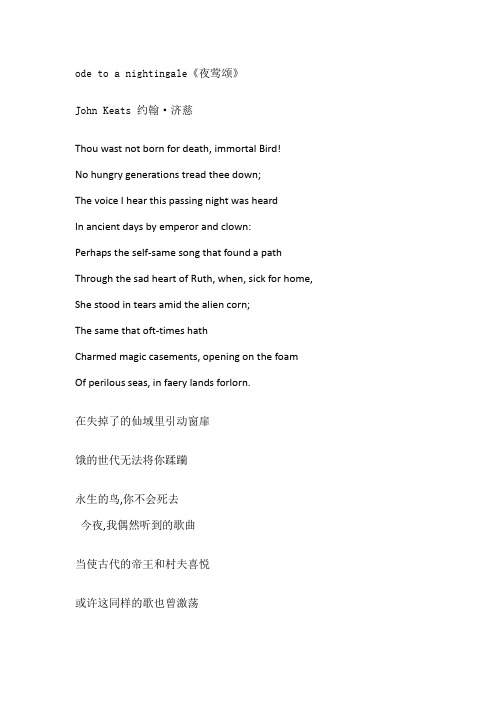
ode to a nightingale《夜莺颂》John Keats 约翰·济慈Thou wast not born for death, immortal Bird!No hungry generations tread thee down;The voice I hear this passing night was heardIn ancient days by emperor and clown:Perhaps the self-same song that found a path Through the sad heart of Ruth, when, sick for home, She stood in tears amid the alien corn;The same that oft-times hathCharmed magic casements, opening on the foam Of perilous seas, in faery lands forlorn.在失掉了的仙域里引动窗扉饿的世代无法将你蹂躏永生的鸟,你不会死去今夜,我偶然听到的歌曲当使古代的帝王和村夫喜悦或许这同样的歌也曾激荡露丝忧郁的心,使她不禁落泪站在异邦的谷田里想著家就是这声音常常一个美女望著大海险恶的浪花1.Thou wast not born for death, immortal B ird! A2.No hungry generations tread thee d own; b3.The voice I hear this passing night was h eard a4.In ancient days by emperor and cl own: b5.Perhaps the self-same song that found a p ath c6.Through the sad heart of Ruth, when, sick for home, d7.She stood in tears amid the alien corn; e8.The same that oft-times h ath c9.Charmed magic casements, opening on the foam d10.Of perilous seas, in faery lands forlorn. eThou wast not born for death, immortal Bird!No hungry generations tread thee down;The voice I hear this passing night was heardIn ancient days by emperor and clown:Perhaps the self-same song that found a pathThrough the sad heart of Ruth, when, sick for home,She stood in tears amid the alien corn;The same that oft-times hathCharmed magic casements, opening on the foamOf perilous seas, in faery lands forlorn.7Thou wast not born for death, immortal Bird! 永生的鸟,你不会死去wast:古代用法,be的第二人称单数过去式。
夜莺颂作品赏析
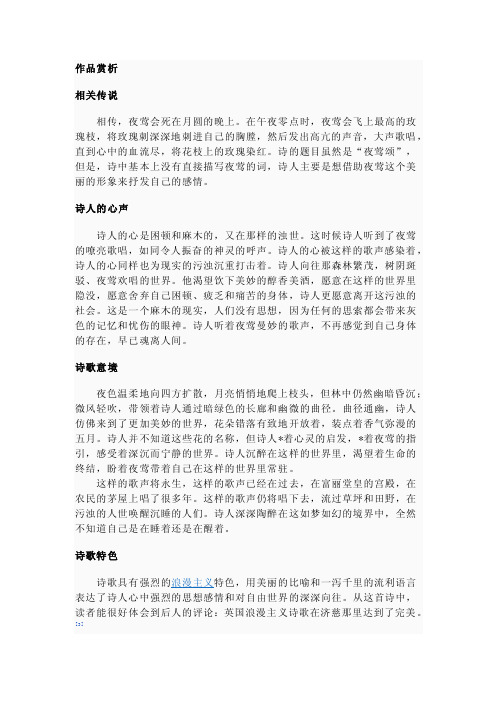
相关传说相传,夜莺会死在月圆的晚上。
在午夜零点时,夜莺会飞上最高的玫瑰枝,将玫瑰刺深深地刺进自己的胸膛,然后发出高亢的声音,大声歌唱,直到心中的血流尽,将花枝上的玫瑰染红。
诗的题目虽然是“夜莺颂”,但是,诗中基本上没有直接描写夜莺的词,诗人主要是想借助夜莺这个美丽的形象来抒发自己的感情。
诗人的心声诗人的心是困顿和麻木的,又在那样的浊世。
这时候诗人听到了夜莺的嘹亮歌唱,如同令人振奋的神灵的呼声。
诗人的心被这样的歌声感染着,诗人的心同样也为现实的污浊沉重打击着。
诗人向往那森林繁茂,树阴斑驳、夜莺欢唱的世界。
他渴望饮下美妙的醇香美酒,愿意在这样的世界里隐没,愿意舍弃自己困顿、疲乏和痛苦的身体,诗人更愿意离开这污浊的社会。
这是一个麻木的现实,人们没有思想,因为任何的思索都会带来灰色的记忆和忧伤的眼神。
诗人听着夜莺曼妙的歌声,不再感觉到自己身体的存在,早已魂离人间。
诗歌意境夜色温柔地向四方扩散,月亮悄悄地爬上枝头,但林中仍然幽暗昏沉;微风轻吹,带领着诗人通过暗绿色的长廊和幽微的曲径。
曲径通幽,诗人仿佛来到了更加美妙的世界,花朵错落有致地开放着,装点着香气弥漫的五月。
诗人并不知道这些花的名称,但诗人*着心灵的启发,*着夜莺的指引,感受着深沉而宁静的世界。
诗人沉醉在这样的世界里,渴望着生命的终结,盼着夜莺带着自己在这样的世界里常驻。
这样的歌声将永生,这样的歌声已经在过去,在富丽堂皇的宫殿,在农民的茅屋上唱了很多年。
这样的歌声仍将唱下去,流过草坪和田野,在污浊的人世唤醒沉睡的人们。
诗人深深陶醉在这如梦如幻的境界中,全然不知道自己是在睡着还是在醒着。
诗歌特色诗歌具有强烈的浪漫主义特色,用美丽的比喻和一泻千里的流利语言表达了诗人心中强烈的思想感情和对自由世界的深深向往。
从这首诗中,读者能很好体会到后人的评论:英国浪漫主义诗歌在济慈那里达到了完美。
[3]1818年,济慈23岁。
那年,诗人患上了肺痨,同时诗人还处于和范妮·布恩小姐的热恋中。
浅析济慈《夜莺颂》
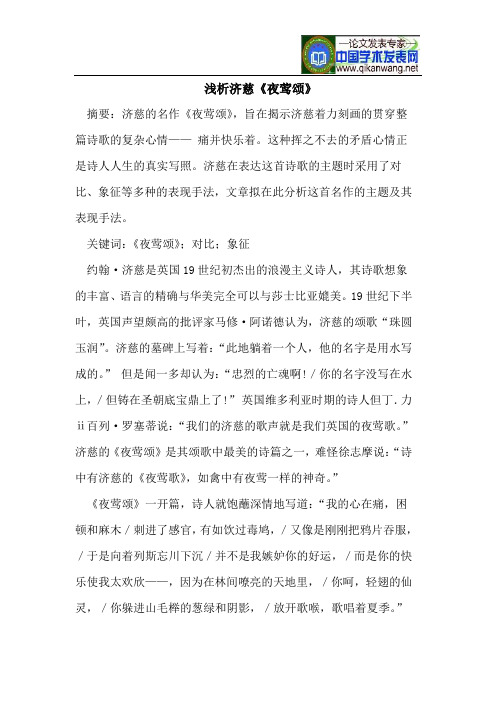
浅析济慈《夜莺颂》摘要:济慈的名作《夜莺颂》,旨在揭示济慈着力刻画的贯穿整篇诗歌的复杂心情——痛并快乐着。
这种挥之不去的矛盾心情正是诗人人生的真实写照。
济慈在表达这首诗歌的主题时采用了对比、象征等多种的表现手法,文章拟在此分析这首名作的主题及其表现手法。
关键词:《夜莺颂》;对比;象征约翰·济慈是英国19世纪初杰出的浪漫主义诗人,其诗歌想象的丰富、语言的精确与华美完全可以与莎士比亚媲美。
19世纪下半叶,英国声望颇高的批评家马修·阿诺德认为,济慈的颂歌“珠圆玉润”。
济慈的墓碑上写着:“此地躺着一个人,他的名字是用水写成的。
”但是闻一多却认为:“忠烈的亡魂啊!/你的名字没写在水上,/但铸在圣朝底宝鼎上了!”英国维多利亚时期的诗人但丁.力ⅱ百列·罗塞蒂说:“我们的济慈的歌声就是我们英国的夜莺歌。
”济慈的《夜莺颂》是其颂歌中最美的诗篇之一,难怪徐志摩说:“诗中有济慈的《夜莺歌》,如禽中有夜莺一样的神奇。
”《夜莺颂》一开篇,诗人就饱蘸深情地写道:“我的心在痛,困顿和麻木/刺进了感官,有如饮过毒鸠,/又像是刚刚把鸦片吞服,/于是向着列斯忘川下沉/并不是我嫉妒你的好运,/而是你的快乐使我太欢欣——,因为在林间嘹亮的天地里,/你呵,轻翅的仙灵,/你躲进山毛榉的葱绿和阴影,/放开歌喉,歌唱着夏季。
”诗人听着夜莺的嘹亮而美妙的歌唱,心被这快乐的歌声感染着。
这种快活太尖锐了,诗人甚至感到心儿在痛,感到自己像是被麻痹了一样。
他向往那林阴繁茂的夜莺欢唱的世界,但是残酷的现实使他又不能够完全投入和享受这种快乐,诗人的心被现实世界的“不尽如人意的因素”打击着。
于是诗人想到了以酒解千愁。
唉,要是有口陈年的佳酿该有多好!“那冷藏/在地下多年的清醇饮料,/一尝就令人想起绿色之邦,/想起花神,恋歌,阳光和舞蹈!”诗人渴望饮下这美妙的醇香美酒,让自己从困顿、疲乏和痛苦的身体游离了出来,与夜莺共入深林,“远远地、远远隐没,让我忘掉/你在树叶问从不知道的一切”。
国外著名诗句
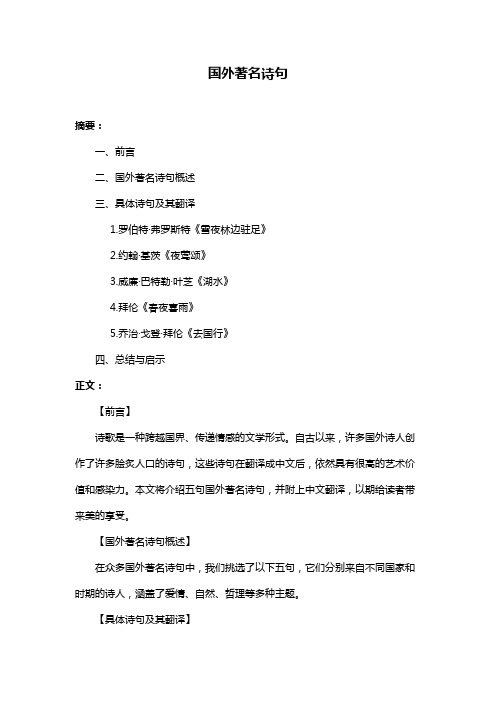
国外著名诗句摘要:一、前言二、国外著名诗句概述三、具体诗句及其翻译1.罗伯特·弗罗斯特《雪夜林边驻足》2.约翰·基茨《夜莺颂》3.威廉·巴特勒·叶芝《湖水》4.拜伦《春夜喜雨》5.乔治·戈登·拜伦《去国行》四、总结与启示正文:【前言】诗歌是一种跨越国界、传递情感的文学形式。
自古以来,许多国外诗人创作了许多脍炙人口的诗句,这些诗句在翻译成中文后,依然具有很高的艺术价值和感染力。
本文将介绍五句国外著名诗句,并附上中文翻译,以期给读者带来美的享受。
【国外著名诗句概述】在众多国外著名诗句中,我们挑选了以下五句,它们分别来自不同国家和时期的诗人,涵盖了爱情、自然、哲理等多种主题。
【具体诗句及其翻译】1.罗伯特·弗罗斯特《雪夜林边驻足》原文:Stopping by Woods on a Snowy Evening翻译:林边雪夜驻足在这首诗中,弗罗斯特描述了一个雪夜在林边驻足的场景,表达了对自然的敬畏和对生活的沉思。
2.约翰·基茨《夜莺颂》原文:Ode to a Nightingale翻译:夜莺颂基茨在这首诗中,通过赞美夜莺的美妙歌声,抒发了对美好时光的留恋和对未来的憧憬。
3.威廉·巴特勒·叶芝《湖水》原文:The Lake Isle of Innisfree翻译:湖水叶芝在这首诗中,描绘了爱尔兰乡村湖光山色的美景,表达了对家乡的眷恋和对宁静生活的向往。
4.拜伦《春夜喜雨》原文:A Spring Night Rain-Praise翻译:春夜喜雨在这首诗中,拜伦以欣喜的心情描绘了春雨滋润大地、带来生机的情景,表达了对生活的热爱。
5.乔治·戈登·拜伦《去国行》原文:Childe Harold"s Pilgrimage翻译:去国行拜伦在这首诗中,以离经叛道的态度表达了对现实的不满和对自由的向往,展示了独立思考的精神。
Keats(夜莺颂)
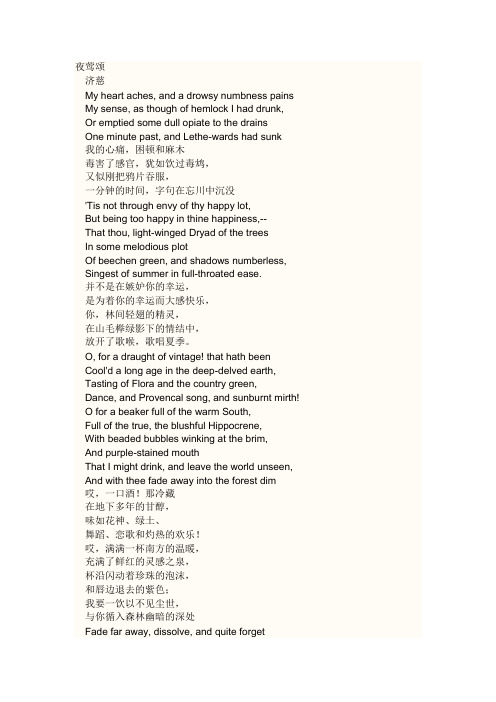
夜莺颂济慈My heart aches, and a drowsy numbness pains My sense, as though of hemlock I had drunk,Or emptied some dull opiate to the drainsOne minute past, and Lethe-wards had sunk我的心痛,困顿和麻木毒害了感官,犹如饮过毒鸩,又似刚把鸦片吞服,一分钟的时间,字句在忘川中沉没'Tis not through envy of thy happy lot,But being too happy in thine happiness,--That thou, light-winged Dryad of the treesIn some melodious plotOf beechen green, and shadows numberless, Singest of summer in full-throated ease.并不是在嫉妒你的幸运,是为着你的幸运而大感快乐,你,林间轻翅的精灵,在山毛榉绿影下的情结中,放开了歌喉,歌唱夏季。
O, for a draught of vintage! that hath beenCool'd a long age in the deep-delved earth, Tasting of Flora and the country green, Dance, and Provencal song, and sunburnt mirth! O for a beaker full of the warm South,Full of the true, the blushful Hippocrene,With beaded bubbles winking at the brim,And purple-stained mouthThat I might drink, and leave the world unseen, And with thee fade away into the forest dim哎,一口酒!那冷藏在地下多年的甘醇,味如花神、绿土、舞蹈、恋歌和灼热的欢乐!哎,满满一杯南方的温暖,充满了鲜红的灵感之泉,杯沿闪动着珍珠的泡沫,和唇边退去的紫色;我要一饮以不见尘世,与你循入森林幽暗的深处Fade far away, dissolve, and quite forgetWhat thou among the leaves hast never known,The weariness, the fever, and the fretHere, where men sit and hear each other groan; Where palsy shakes a few, sad, last gray hairs, Where youth grows pale, and spectre-thin, and dies; Where but to think is to be full of sorrowAnd leaden-eyed despairs,Where Beauty cannot keep her lustrous eyes,Or new Love pine at them beyond to-morrow.远远的离开,消失,彻底忘记林中的你从不知道的,疲惫、热病和急躁这里,人们坐下并听着彼此的呻吟;瘫痪摇动了一会儿,悲伤了,最后的几丝白发,青春苍白,古怪的消瘦下去,后来死亡;铅色的眼睛绝望着;美人守不住明眸,新的恋情过不完明天。
夜莺颂及其赏析

Ode To A NightingaleJohn Keats夜莺颂济慈My heart aches, and a drowsy numbness pains My sense, as though of hemlock I had drunk, Or emptied some dull opiate to the drainsOne minute past, and Lethe-wards had sunk我的心痛,困顿和麻木毒害了感官,犹如饮过毒鸩,又似刚把鸦片吞服,一分钟的时间,字句在忘川中沉没'Tis not through envy of thy happy lot,But being too happy in thine happiness,--That thou, light-winged Dryad of the treesIn some melodious plotOf beechen green, and shadows numberless, Singest of summer in full-throated ease.并不是我嫉妒你的好运,而是你的快乐使我太欢欣,在林间嘹亮的天地里你呵,林间轻翅的精灵,躲进山毛榉的葱绿和阴荫影放开了歌喉,歌唱着夏季。
O, for a draught of vintage! that hath beenCool'd a long age in the deep-delved earth, Tasting of Flora and the country green, Dance, and Provencal song, and sunburnt mirth! O for a beaker full of the warm South,Full of the true, the blushful Hippocrene,With beaded bubbles winking at the brim,And purple-stained mouthThat I might drink, and leave the world unseen, And with thee fade away into the forest dim哎,要是有一口酒!那冷藏在地下多年的甘醇,味如花神、绿土、舞蹈、恋歌和灼热的欢乐!哎,满满一杯南方的温暖,充满了鲜红的灵感之泉,杯沿明灭着珍珠的泡沫,给红唇染上紫斑我要一饮而尽悄然离开尘寰和你同去幽暗的林中隐没Fade far away, dissolve, and quite forgetWhat thou among the leaves hast never known, The weariness, the fever, and the fretHere, where men sit and hear each other groan; Where palsy shakes a few, sad, last gray hairs, Where youth grows pale, and spectre-thin, and dies; Where but to think is to be full of sorrowAnd leaden-eyed despairs,Where Beauty cannot keep her lustrous eyes,Or new Love pine at them beyond to-morrow.远远地,远远的隐没,让我忘掉你在树林间从不知道的一切,忘记这疲惫、热病和急躁使人对坐而悲叹的世界在这里,少许麻痹,悲伤就会蔓延至后几丝白发;在这里,青春苍白,伴随着灵魂的游离和肉体的死亡;在这里,稍一思索,就充满了忧伤和灰色的绝望;在这里,美人守不住善睐明眸。
ode to a nightingale中英对照

Ode to a Nightingale by John Keats
译文:夜莺颂
I heard a nightingale singing
在幽暗的柏树下我坐着
In a dark and shadowy grove,
夜莺独鸣,四围灌木环绕
A voice so tremulous and true
它的歌声如泣如诉
That I could scarcely hear the note,
难以听见这音符
It was a melancholy strain
曲调忧郁哀愁
To haunt my woods by night alone,
孤独在夜晚萦绕在我树林中
And移民海外的日本艺人、音乐人或演员中,以流行歌手
最为常见。
许多日本流行歌手会以艺名或昵称进行音乐活动,其中一些艺人甚至会同时从事音乐、演艺和模特等多重职业。
在日本,偶像组合是乐坛主流,而单打独斗的歌手则相对较少。
济慈代表作(双语)

济慈《夜莺颂》是1818年济慈23岁的作品。
该诗歌一共八节80余行,该诗歌具有强烈的浪漫主义特色,用美丽的比喻和一泻千里的流利语言表达了诗人心中强烈的思想感情和对自由世界的深深向往。
Ode to a Nightingale 夜莺颂- John Keats 中英双语对照My heart aches, and a drowsy numbness pains 我的心痛,困顿和麻木My sense, as though of hemlock I had drunk, 毒害了感官,犹如饮过毒鸩,Or emptied some dull opiate to the drains 又似刚把鸦片吞服,One minute past, and Lethe-wards had sunk 一分钟的时间,字句在忘川中沉没'Tis not through envy of thy happy lot, 并不是在嫉妒你的幸运,But being too happy in thine happiness,-- 是为着你的幸运而大感快乐,That thou, light-winged Dryad of the trees 你,林间轻翅的精灵,In some melodious plot 在山毛榉绿影下的情结中,Of beechen green, and shadows numberless,Singest of summer in full-throated ease. 放开了歌喉,歌唱夏季。
O, for a draught of vintage! that hath been 哎,一口酒!那冷藏Cool'd a long age in the deep-delved earth, 在地下多年的甘醇,Tasting of Flora and the country green, 味如花神、绿土、Dance, and Provencal song, and sunburnt mirth! 舞蹈、恋歌和灼热的欢乐!O for a beaker full of the warm South, 哎,满满一杯南方的温暖,Full of the true, the blushful Hippocrene, 充满了鲜红的灵感之泉,With beaded bubbles winking at the brim, 杯沿闪动着珍珠的泡沫,And purple-stained mouth 和唇边退去的紫色;That I might drink, and leave the world unseen, 我要一饮以不见尘世,And with thee fade away into the forest dim 与你循入森林幽暗的深处Fade far away, dissolve, and quite forget 远远的离开,消失,彻底忘记What thou among the leaves hast never known, 林中的你从不知道的,The weariness, the fever, and the fret 疲惫、热病和急躁Here, where men sit and hear each other groan; 这里,人们坐下并听着彼此的呻吟;Where palsy shakes a few, sad, last gray hairs, 瘫痪摇动了一会儿,悲伤了,最后的几丝白发,Where youth grows pale, and spectre-thin, and dies; 青春苍白,古怪的消瘦下去,后来死亡;Where but to think is to be full of sorrowAnd leaden-eyed despairs, 铅色的眼睛绝望着;Where Beauty cannot keep her lustrous eyes, 美人守不住明眸,Or new Love pine at them beyond to-morrow. 新的恋情过不完明天。
夜莺颂ode to a nightingale
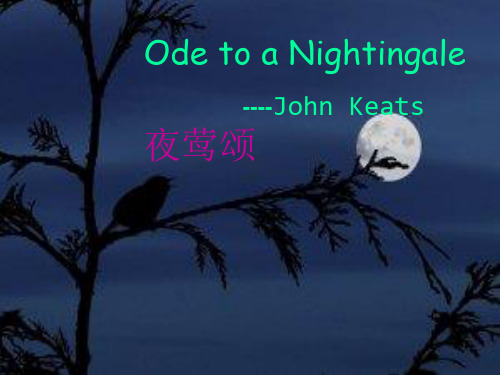
The lifetime of John Keats
The poet
John Keats (31 October 1795 – 23 February 1821) was an English Romantic poet. He was one of the main figures of the second generation of Romantic poets along with Lord Byron 拜伦 and Percy Bysshe Shelley波比雪莱 , despite his work only having been in publication for four years before his death. Although his poems were not generally well received by critics • ( during his life, his reputation grew after his death, so that by the end of the 19th century he had become one of the most beloved of all English poets. He had a significant influence on a diverse range of poets and writers. Jorge Luis Borges stated that his first encounter with Keats was the most significant literary experience of his life.
两个意象的交叉
诗人的“心莺的“欢欣”
Structure[edit]
John_Keats_夜莺颂

According to legend , the nightingale will die on the full moon night. In the beautiful moonlight , the nightingale fly onto the highest branches of roses, let the rose thorn stab deeply into his chest, and sing loudly in a high-pitched voice , until the blood of its hearts dry up and red the roses into the blood color. Keats did not focus on the discription of the nightingale, instead, he borrowed the image of nightingale to express his feelings.
Summary: theme
• Unlike other poets, this lass sings alone, isolated from both her predecessors (her "poetic tradition") and any audience. Dryden, Pope, Gray, and so many others defined themselves by quoting from classical literature and each other. Wordsworth's "The Solitary Reaper" shatters this continuity. Her song, like a found poem, springs directly from nature, without literary context. Her "music" runs like water ("overflowing" the valley) and surpasses the beauty of two celebrated English song-birds, the nightingale and the cuckoo. Here again the speaker raids conventional poetic language, as if incapable of finding truly suitable language.
关于黑暗的英文诗文
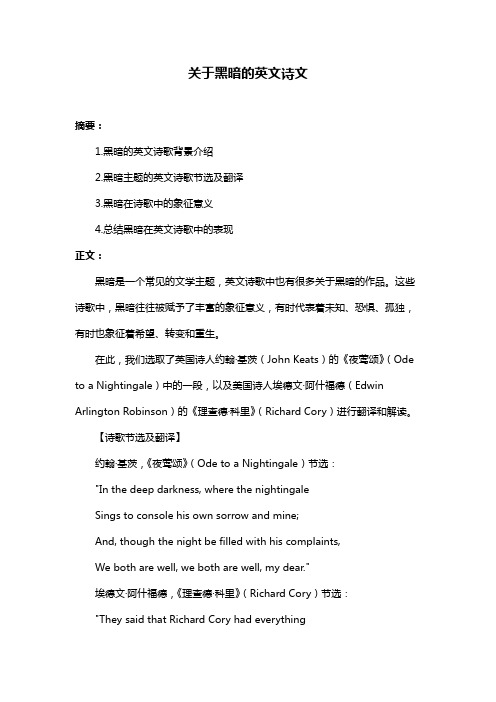
关于黑暗的英文诗文摘要:1.黑暗的英文诗歌背景介绍2.黑暗主题的英文诗歌节选及翻译3.黑暗在诗歌中的象征意义4.总结黑暗在英文诗歌中的表现正文:黑暗是一个常见的文学主题,英文诗歌中也有很多关于黑暗的作品。
这些诗歌中,黑暗往往被赋予了丰富的象征意义,有时代表着未知、恐惧、孤独,有时也象征着希望、转变和重生。
在此,我们选取了英国诗人约翰·基茨(John Keats)的《夜莺颂》(Ode to a Nightingale)中的一段,以及美国诗人埃德文·阿什福德(Edwin Arlington Robinson)的《理查德·科里》(Richard Cory)进行翻译和解读。
【诗歌节选及翻译】约翰·基茨,《夜莺颂》(Ode to a Nightingale)节选:"In the deep darkness, where the nightingaleSings to console his own sorrow and mine;And, though the night be filled with his complaints,We both are well, we both are well, my dear."埃德文·阿什福德,《理查德·科里》(Richard Cory)节选:"They said that Richard Cory had everythingAnd nothing was his own;They envied him his health and wealth and wisdom,And envied him his length of days,And envied him his happy lot;But they didn"t know that he envied them."【黑暗在诗歌中的象征意义】在约翰·基茨的《夜莺颂》中,黑暗代表着诗人内心的忧伤和孤独。
- 1、下载文档前请自行甄别文档内容的完整性,平台不提供额外的编辑、内容补充、找答案等附加服务。
- 2、"仅部分预览"的文档,不可在线预览部分如存在完整性等问题,可反馈申请退款(可完整预览的文档不适用该条件!)。
- 3、如文档侵犯您的权益,请联系客服反馈,我们会尽快为您处理(人工客服工作时间:9:00-18:30)。
作者简介济慈(1795—1821),19世纪英国著名浪漫主义诗人。
生于伦敦一个马夫家庭。
由于家境贫困,诗人不满16岁就离校学医,当学徒。
1816年,他弃医从文,开始诗歌创作。
1817年诗人出版第一本诗集。
1818年,他根据古希腊美丽神话写成的《安狄米恩》问世。
此后诗人进入诗歌创作的鼎盛时期,先后完成了《伊莎贝拉》、《圣亚尼节前夜》、《许佩里恩》等著名长诗,还有最脍炙人口的《夜莺颂》、《希腊古瓮颂》、《秋赋》等诗歌。
也是在1818年,诗人爱上了范妮·布恩小姐,同时诗人的身体状况也开始恶化。
在痛苦、贫困和甜蜜交织的状况下,诗人写下了大量的著名诗篇。
1821年,诗人前往意大利休养,不久病情加重,年仅25岁就离开了人世。
名作赏析1818年,济慈23岁。
那年,诗人患上了肺痨,同时诗人还处于和范妮·布恩小姐的热恋中。
正如诗人自己说的,他常常想的两件事就是爱情的甜蜜和自己死去的时间。
在这样的情况下,诗人情绪激昂,心中充满着悲愤和对生命的渴望。
在一个深沉的夜晚,在浓密的树枝下,在鸟儿嘹亮的歌声中,诗人一口气写下了这首8节80多行的《夜莺颂》。
相传,夜莺会死在月圆的晚上。
在午夜0点时,夜莺会飞上最高的玫瑰枝,将玫瑰刺深深地刺进自己的胸膛,然后发出高亢的声音,大声歌唱,直到心中的血流尽,将花枝上的玫瑰染红。
诗的题目虽然是“夜莺颂”,但是,诗中基本上没有直接描写夜莺的词,诗人主要是想借助夜莺这个美丽的形象来抒发自己的感情。
诗人的心是困顿和麻木的,又在那样的浊世。
这时候诗人听到了夜莺的嘹亮歌唱,如同令人振奋的神灵的呼声。
诗人的心被这样的歌声感染着,诗人的心同样也为现实的污浊沉重打击着。
诗人向往那森林繁茂,树阴斑驳、夜莺欢唱的世界。
他渴望饮下美妙的醇香美酒,愿意在这样的世界里隐没,愿意舍弃自己困顿、疲乏和痛苦的身体,诗人更愿意离开这污浊的社会。
这是一个麻木的现实,人们没有思想,因为任何的思索都会带来灰色的记忆和忧伤的眼神。
诗人听着夜莺曼妙的歌声,不再感觉到自己身体的存在,早已魂离人间。
夜色温柔地向四方扩散,月亮悄悄地爬上枝头,但林中仍然幽暗昏沉;微风轻吹,带领着诗人通过暗绿色的长廊和幽微的曲径。
曲径通幽,诗人仿佛来到了更加美妙的世界,花朵错落有致地开放着,装点着香气弥漫的五月。
诗人并不知道这些花的名称,但诗人*着心灵的启发,*着夜莺的指引,感受着深沉而宁静的世界。
诗人沉醉在这样的世界里,渴望着生命的终结,盼着夜莺带着自己在这样的世界里常驻。
这样的歌声将永生,这样的歌声已经在过去,在富丽堂皇的宫殿,在农民的茅屋上唱了很多年。
这样的歌声仍将唱下去,流过草坪和田野,在污浊的人世唤醒沉睡的人们。
诗人深深陶醉在这如梦如幻的境界中,全然不知道自己是在睡着还是在醒着。
诗歌具有强烈的浪漫主义特色,用美丽的比喻和一泻千里的流利语言表达了诗人心中强烈的思想感情和对自由世界的深深向往。
从这首诗中,我们能很好体会到后人的评论:英国浪漫主义诗歌在济慈那里达到了完美。
夜莺颂济慈My heart aches, and a drowsy numbness pains 我的心在痛,困顿和麻木My sense, as though of hemlock I had drunk, 刺进了感官有如饮过毒鸩Or emptied some dull opiate to the drains 又像是刚把鸦片吞服One minute past, and Lethe-wards had sunk: 于是向列斯忘川下沉'Tis not through envy of thy happy lot, 并不是我忌妒你的好运But being too happy in thine happiness -- 而是你的快乐使我太欢欣--That thou, light winged Dryad of the trees, 因为在林间嘹亮的天地里In some melodious plot 你呵,轻翅的仙灵Of beechen green, and shadows numberless, 你躲进山毛榉的葱绿和荫影Singest of summer in full-throated eas e. 放开了歌喉,歌唱著夏季O, for a draught of vintage! that hath been 唉,要是有一口酒,那冷藏Cooled a long age in the deep-delved earth, 在地下多年的清醇饮料T asting of Flora and the country green, 一尝就令人想起绿色之邦Dance, and Provencal song, and sunburnt mirth! 想起花神,恋歌,阳光和舞蹈O for a beaker full of the warm South, 要是有一杯南国的温暖Full of the true, the blushful Hippocrene, 充满了鲜红的灵感之泉With beaded bubbles winking at the brim, 杯缘明灭著珍珠的泡沫And purple-stained mouth, 给嘴唇染上紫斑That I may drink, and leave the world unseen, 我要一饮而尽而悄然离开尘寰And with thee fade away into the forest dim. 和你同去幽暗的林中隐没Fade far away, dissolve, and quite forget 远远地,远远隐没,让我忘掉What thou amongst the leaves hast never known, 你在树叶间从不知道的一切The weariness, the fever, and the fret 忘记这疲劳,热病,和焦躁Here, where men sit and hear each other groan; 这使人对坐而悲叹的世界Where palsy shakes a few, sad, last grey hairs. 在这里,青春,苍白,削瘦,死亡Where youth grows pale, and spectre-thin, and dies; 而瘫痪有几根白发在摇摆Where nut to think is to be full of sorrow 在这里,稍一思索就充满了And leaden-eyed despairs; 忧伤和灰暗的绝望Where Beauty cannot keep her lustrous eyes, 而美保持不住明眸的光彩Or new Love pine at them beyond to-morrow. 新生的爱情活不到明天就枯凋Away! away! for I will fly to thee, 去吧!去吧!我要朝你飞去Not charioted by Bacchus and his pards, 不用和酒神坐文豹的车驾But on the viewless wings of Poesy, 我要展开诗歌底无形的羽翼Though the dull brain perplexes and retards. 尽管这头脑已经困顿,疲乏Already with thee! tender is the night, 去了,我已经和你同往And haply the Queen-Moon is on her throne, 夜这般温柔,月后正登上宝座Clustered around by all her starry Fays; 周围是侍卫她的一群星星But here there is no light, 但这儿不甚明亮Save what from heaven is with the breezes blown 除了有一线天光,被微风带过Through verduous glooms and winding mossy ways. 葱绿的幽暗和藓苔的曲径I cannot se what flowers are at my feet, 我看不出是哪种花在脚旁Nor what soft incense hangs upon the boughs, 什麼清香的花挂在树枝上But, in embalmed darkness, guess each sweet 在温馨的幽暗理,我只能猜想Wherewith the seasonable month endows 这时令该把哪种芬芳The grass, the thicket, and the fruit-tree wild -- 赋予这果树,林莽和草丛White hawthorn, and the pastoral eglantine; 这白枳花,和田野的玫瑰Fast fading violets covered up in leaves; 这绿叶堆中易凋谢的紫罗兰And mid-May's eldest child, 还有五月中旬的娇宠The coming musk-rose, full of dewy wine, 这缀满了露酒的麝香蔷薇The murmurous haunt of flies on summer eves. 它成了夏夜蚊蚋嗡营的港湾Darkling I listen; and for many a time 我在黑暗中里倾听,多少次I have been half in love with easeful Death, 我几乎爱上了静谧的死亡Called him soft names in many a mused rhyme, 我在诗思里用尽了我言辞T o take into the air my quiet breath; 求他把我的一息散入空茫Now more than ever seems it rich to die, 而现在,死更是多麼的富丽T o cease upon the midnight with no pain, 在午夜里溘然魂离人间While thou art pouring forth thy soul abroad 当你正倾泻你的心怀In such an ecstasy! 发出这般的狂喜Still wouldst thou sing, and I have ears in vain -- 你仍将歌唱,但我却不再听?To thy high requiem become a sod. 你的莽歌只能唱给泥草一块Thou wast not born for death, immortal Bird! 永生的鸟,你不会死去No hungry generations tread thee down; 饿的世代无法将你蹂躏The voice I hear this passing night eas heard 今夜,我偶然听到的歌曲In ancient days by emperor and clown: 当使古代的帝王和村夫喜悦Perhaps the self-same song that found a path 或许这同样的歌也曾激荡Through the sad heart of Ruth, when, sick for home, 露丝忧郁的心,使她不禁落泪She stood in tears amid the alien corn; 站在异邦的谷田里想著家The same that oft-times hath 就是这声音常常Charmed magic casements, opening on the foam 在失掉了的仙域里引动窗扉Of perilous seas, in faery lands forlorn. 一个美女望著大海险恶的浪花Forlorn! the very word is like a bell 失掉了,这句话好比一声钟T o toll me back from thee to my sole self! 使我猛省到我站脚的地方Adieu! the fancy cannot cheat so well 别了!幻想,这骗人的妖童As she is famed to do, deceiving elf. 不能老耍弄它盛传的伎俩Adieu! adieu! thy plaintive anthem fades 别了!别了!你怨诉的歌声Past the near meadows, over the still stream, 流过草坪,越过幽静的溪水Up the hill-side; and now 'tis buried deep 溜上山坡,而此时它正深深In the next valley-glades: 埋在附近的溪谷中Was is a vision, or a waking dream? 这是个幻觉,还是梦寐Fled is that music -- Do I wake or sleep? 那歌声去了-我是睡?是醒?。
